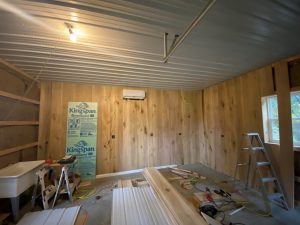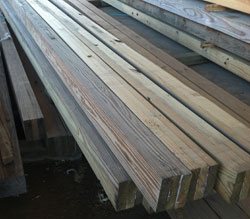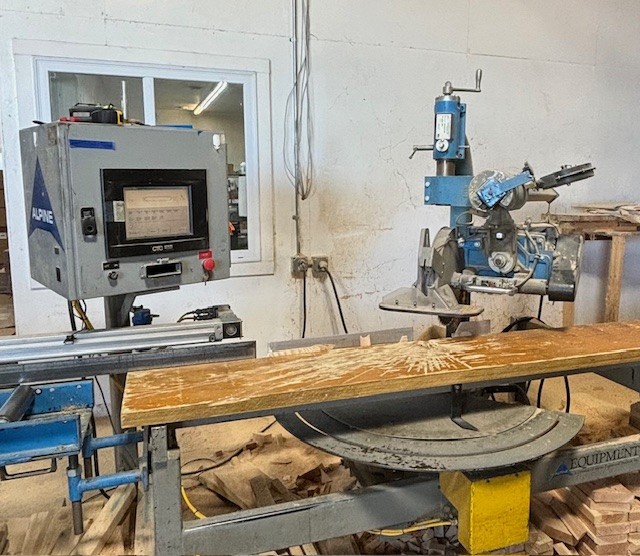TECO nails
They actually no longer exist.
TECO was the name of a company (Timber Engineering Company) which manufactured 10 penny, also known as 10d common nails (0.148 inch diameter) which were 1-1/2 inches in length. The company is now defunct, but the name has stuck.
Joist Hanger Nails
These nails are also referred to as “joist hanger nails”, as their original design was for use in joist hangers. This terminology is not necessarily correct, as many joist hanger applications require the use of nails longer in length than 1-1/2”.
The major manufacturers of joist hangers in the United States (Simpson and USP) both provide detailed instructions online, which specify the minimum sizes of fasteners which will be adequate to carry the maximum design loads of any specific hanger.
Do NOT use these nails!
Some fasteners NOT to use include deck screws. Besides the issue of diameter, they are also made from steel alloy which is fairly brittle – as such, they can snap when loaded in shear. Nails with diameters of less than 0.148 of an inch (such as 6d, 8d or roofing nails) should also not be used.
The 10d common nail diameter (0.148”) is going to be fairly typical as a specification of the hanger manufacturer. As to length, judge the nail length needed, by the thickness of the member the nail is being driven into.
LU Hanger Applications
As an example, a fairly common part for attaching a dimensional lumber floor joist or roof purlin (2×4, 2×6, 2×8, etc.) to a beam or prefabricated wood truss would be a member of the “LU” series (LU24, LU26, LU28, etc.). When nailing through the holes in the hanger into the carried joist, normally a maximum 1-1/2” long nail can be used. With longer nails, the nail tip would come out the opposite side of the lumber. This is not necessarily a “ bad” thing, but the tip hanging out there is not doing anything, and becomes a potential danger for hooking important things on it, like fingers!
 Single member = 1-1/2” & double members = 10d common nails (3”)
Single member = 1-1/2” & double members = 10d common nails (3”)
When nailing through the hanger holes into the carrying member, if the member is a single 2x in width, then 1-1/2” long nails will be the limitation. In the event the member is a double 2x, or a thicker beam, then it may well be appropriate, as well as prudent, to go to 10d common nails (0.148 x 3” long).










I greatly appreciate your explanation, but you MUST make a correction: the 10d diameter is 0.148″, NOT .0148″. Think about it. In rough terms, a 10d is about 1/8 of an inch, not 1/10 of 1/8.
One other suggestion: Another application for full-size 10d nails is the angled holes in the joist portion of LUS-style hangers, which angle the nails at about 45 degrees to the joist and ledger. Simpson specifies 0.148″x3″ for these holes. In our business, we always use the LUS style when available.
Barry ~ You are absolutely correct on the location of the decimal point! Nice to know someone is paying attention.
10d common nails are not .0148″ in diameter. They are .148″. .0148″ is thinner than fine sewing needles. Pneumatic framing nails typically come in four diameters: .113, .120. .131 and .148 inches.
Roger ~ You are absolutely correct on the location of the decimal point! Nice to know someone is paying attention.
.148 is no longer a common pneumatic framing nail. The industry standard is now 0.131 Not even Fastenal or any of the supply houses carries 0.148 nor can you order them except from a very few mail order places. I no longer see any spec calling out for such an uncommon unavailable nail.
Ken ~ We have had no problems with acquiring these nails, in fact we have pallets of them available in our warehouse. If you need one carton, or a pallet of them, please give us a call.
Seven years later can we revisit this topic? Like Ken I don’t see 0.148 nails. When talking to local framers they all indicate that they generally use 0.131 which are readily available. The framers also indicated that 0.148 nails can cause more splitting especially the vertical 2×6 spacer blocks all over the building.
Does Hansen still have a source for 0,148 nails? Or is a 0.131 an acceptable replacement?
Thank you,
While our experience has been splitting has not been an issue, last summer we switched over to all wood-to-wood connections being done with Simpson structural screws and providing them. We may have some 0.148 nails remaining in inventory. Please reach out to Materials@HansenPoleBuildings.com
Why are 1 1/2” tico nails called 10d.
Isn’t a 10d nail a 3” long nail, and a 1 1/2” nail a 4d nail?
Thank you, in advance, for helping me clear up this CONFUSION.
Yes, I agree it is confusing. It would be so much easier if nails were sold by actual diameter x actual length. Tico nails can be 10d diameter, with a lesser length. 0.148″ x 1-1/2″ would be so much better as a description.
TECO clips. NOT TiCO. T-imber E-ngineering Co-mpany. T – E – Co. was on the packaging when delivered to site.
What gun shoots 3″ hanger nails? Most are 1 1/2 to 2 1/2
I do not believe any do – we have since gone to all Simpson Structural screws to attach hangers.